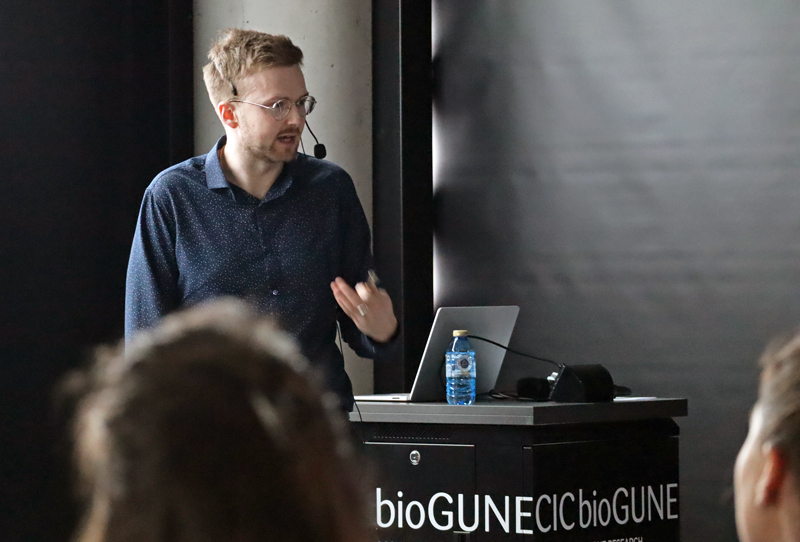
2025/01/29
CIC bioGUNE strengthens the link between Science and Communication
CIC bioGUNE, member of BRTA, hosted a training workshop on January 28th and 29th aimed at strengthening the connection between science and scientific communication. This activity, part of the FRONTIERS: Science Journalism in Residency program funded by the European Research Council (ERC), featured Ruairi James Mackenzie, a science journalist in residence at the center.
Ruairi Mackenzie, an independent journalist based in Glasgow, Scotland, has an outstanding career in science communication and spent the last three months immersed in CIC bioGUNE’s research projects focused on rare diseases. With a background in neuroscience from the University of Edinburgh and the University of Cambridge, his professional trajectory includes roles such as senior editor at Technology Networks and contributions to outlets like National Geographic, The Scientist, and Science News Explores. His work was also nominated in 2024 for the Best Specialist Feature category by the Association of British Science Writers.
During the event, Mackenzie delivered a seminar titled Connected by Curiosity: What Science and Journalism Can Learn From Each Other, where he discussed effective ways to communicate scientific findings. He shared insights into transforming complex research into accessible stories, emphasizing the importance of scientists playing an active role in disseminating their results. The seminar highlighted how narrative approaches, and scientific rigor can combine to enhance the impact of discoveries.
The training continued with a practical workshop, Media and Science Communication Workshop, designed to equip participants with tools for clear and effective science communication. Topics included strategies for simplifying scientific concepts and practical advice on crafting messages that resonate with wider audiences. Additionally, the workshop provided a space for participants to share their experiences interacting with the media, fostering collaborative learning.
Open to all researchers at CIC bioGUNE, this workshop underscores the center’s commitment to fostering a strong culture of scientific communication. Initiatives like this emphasize the importance of equipping scientists not only to conduct innovative research but also to share their knowledge clearly and responsibly, contributing to the broader understanding and advancement of science in society.
About CIC bioGUNE
The Centre for Cooperative Research in Biosciences (CIC bioGUNE), member of the Basque Research & Technology Alliance (BRTA), located in the Bizkaia Technology Park, is a biomedical research organisation conducting cutting-edge research at the interface between structural, molecular and cell biology, with a particular focus on generating knowledge on the molecular bases of disease, for use in the development of new diagnostic methods and advanced therapies.
About BRTA
BRTA is an alliance of 4 collaborative research centres (CIC bioGUNE, CIC nanoGUNE, CIC biomaGUNE y CIC energiGUNE) and 13 technology centres (Azterlan, Azti, Ceit, Cidetec, Gaiker, Ideko, Ikerlan, Leartiker, Lortek, Neiker, Tecnalia, Tekniker y Vicomtech) with the main objective of developing advanced technological solutions for the Basque corporate fabric.
With the support of the Basque Government, the SPRI Group and the Provincial Councils of the three territories, the alliance seeks to promote collaboration between the research centres, strengthen the conditions to generate and transfer knowledge to companies, contributing to their competitiveness and outspreading the Basque scientific-technological capacity abroad.
BRTA has a workforce of 3,500 professionals, executes 22% of the Basque Country's R&D investment, registers an annual turnover of more than 300 million euros and generates 100 European and international patents per year.

See a large version of the first picture





